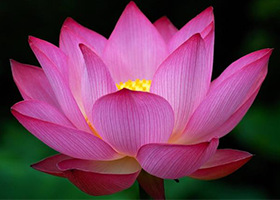Art and Culture
Art | Music | Poetry | Literature | Culture | New Science | Ancient Cultivation Stories
-
Painting: A Tragedy in China
2006-06-21 A wife weeps beside her husband, who has been tortured to death at a brainwashing center. He holds in his hand a document that he was forced to sign, a pledge that defames Falun Gong.
A wife weeps beside her husband, who has been tortured to death at a brainwashing center. He holds in his hand a document that he was forced to sign, a pledge that defames Falun Gong. -
Ancient Cultivation Stories: Strength Comes from Having No Desires
2006-06-20 Confucius replied, "So-called 'desires' do not necessarily mean craving for money. To put it simply, a selfish thought that makes one struggle to have an advantage over others is a desire. Although Shen Cheng is upright, he is fond of gaining superiority, and often becomes sentimental easily. This in itself is a kind of desire. How could a person like him be called strong?"
Confucius replied, "So-called 'desires' do not necessarily mean craving for money. To put it simply, a selfish thought that makes one struggle to have an advantage over others is a desire. Although Shen Cheng is upright, he is fond of gaining superiority, and often becomes sentimental easily. This in itself is a kind of desire. How could a person like him be called strong?" -
Poem: Let the Buddha Light Shine
2006-06-19 Let the Buddha light shine for evermoreheaven and earth rejoicein the "Great Buddha Law."Beyond clouded skiesand worlds of oldwhere countless beings ascendboundless hearts unfold.
Let the Buddha light shine for evermoreheaven and earth rejoicein the "Great Buddha Law."Beyond clouded skiesand worlds of oldwhere countless beings ascendboundless hearts unfold. -
Painting: Faith Unchained
2006-06-18 Inspired by her own experience of being incarcerated in the Chinese prison, Amy Fan created this painting to express Falun Gong practitioners’ determination to adhere to their belief in Falun Gong’s cultivation principles, Truthfulness, Compassion and Forbearance, despite being deprived of their freedom and subjected to daily verbal abuse and violence in the forced labour camps and prisons in China.
Inspired by her own experience of being incarcerated in the Chinese prison, Amy Fan created this painting to express Falun Gong practitioners’ determination to adhere to their belief in Falun Gong’s cultivation principles, Truthfulness, Compassion and Forbearance, despite being deprived of their freedom and subjected to daily verbal abuse and violence in the forced labour camps and prisons in China. -
Stories from Ancient China: Broadmindedness and Modesty
2006-06-17 Han Dynasty (206BC-220AD) Emperor Guangwu (Liu Xiu 5 BC-57AD), was highly respected by his ministers and people because of his broadmindedness, modesty, respectfulness, and approachability. Unlike despotic rulers, he was never opinionated, conceited, arrogant, or patronising. Even people who had a bias against him would swear allegiance to him after they got to know him better.
Han Dynasty (206BC-220AD) Emperor Guangwu (Liu Xiu 5 BC-57AD), was highly respected by his ministers and people because of his broadmindedness, modesty, respectfulness, and approachability. Unlike despotic rulers, he was never opinionated, conceited, arrogant, or patronising. Even people who had a bias against him would swear allegiance to him after they got to know him better. -
Stories from Ancient China: Keeping A Pure Heart with Few Desires
2006-06-16 A pure heart with few desires, restraining greed and attachments is a principle a person that cultivates his heart should follow. The ancient sages said that only when a person cultivated himself, could he govern his state and stabilise the world. The king of Lugong cautioned the king of Weihui that a king's indulging himself would reduce his kingdom to ruins. The virtuous and gifted Prime Minister, Wei Zheng, once advised Emperor Tang Taizong to critically examine himself in ten aspects.
A pure heart with few desires, restraining greed and attachments is a principle a person that cultivates his heart should follow. The ancient sages said that only when a person cultivated himself, could he govern his state and stabilise the world. The king of Lugong cautioned the king of Weihui that a king's indulging himself would reduce his kingdom to ruins. The virtuous and gifted Prime Minister, Wei Zheng, once advised Emperor Tang Taizong to critically examine himself in ten aspects. -
Painting: Assimilation
2006-06-15
-
The Superior Man and the Inferior Man
2006-06-14 Confucius said, "A superior man is contented and composed. An inferior man is pathetic." "The superior man is aware of righteousness, the inferior man is aware of advantage." "The superior man cares about virtue; the inferior man cares about material things." "The progress of the superior man is upwards; the progress of the inferior man is downwards."
Confucius said, "A superior man is contented and composed. An inferior man is pathetic." "The superior man is aware of righteousness, the inferior man is aware of advantage." "The superior man cares about virtue; the inferior man cares about material things." "The progress of the superior man is upwards; the progress of the inferior man is downwards." -
Drawing: Feitian - Heavenly Beauty
2006-06-13
-
Poem: Across the Ages
2006-06-12 A call across the Agesfrom endless seas to distant shoreswith all darkness fadingdestined hearts awakeningcomes the new cosmosand the brightest of dawns.
A call across the Agesfrom endless seas to distant shoreswith all darkness fadingdestined hearts awakeningcomes the new cosmosand the brightest of dawns. -
Stories from Ancient China: Confucius's Viewpoint on "Praying"
2006-06-11 Wang Sungu was one of Confucius's disciples in the Kingdom of Wei. Even though he was a high ranking government official, Wang still called Confucius his teacher. One day Wang asked Confucius a question, "There is an old saying, 'It's smarter to please the God Au than to please the God Zao.' What do you think?"
Wang Sungu was one of Confucius's disciples in the Kingdom of Wei. Even though he was a high ranking government official, Wang still called Confucius his teacher. One day Wang asked Confucius a question, "There is an old saying, 'It's smarter to please the God Au than to please the God Zao.' What do you think?" -
A Hundred Schools of Thought
2006-06-10 The "Tao" of Lao Zi would spread in the world. Hundreds of schools of thought bloomed. Different theories, thoughts and opinions mushroomed. This age was the Golden Age of Chinese thinking. It was comparable to the ancient Greek times. During this period, the Chinese culture, ideas and wisdom saw significant developments. It was a grand age comparable to the Renaissance.
The "Tao" of Lao Zi would spread in the world. Hundreds of schools of thought bloomed. Different theories, thoughts and opinions mushroomed. This age was the Golden Age of Chinese thinking. It was comparable to the ancient Greek times. During this period, the Chinese culture, ideas and wisdom saw significant developments. It was a grand age comparable to the Renaissance. -
The Ancient Chinese People's View of the Importance of a Harmonious Family Life
2006-06-08 The Classic of Rites says: "Regulated families bring about well-governed states." A father is kind and a son is filial, brothers are amicable and a wife is her husband's echo. These have been family guidelines upheld by Chinese people for thousands of years. They are principles of morality and justice which people should believe and obey.
The Classic of Rites says: "Regulated families bring about well-governed states." A father is kind and a son is filial, brothers are amicable and a wife is her husband's echo. These have been family guidelines upheld by Chinese people for thousands of years. They are principles of morality and justice which people should believe and obey. -
Pome: The Waking Heart
2006-06-07 Towards the highest of summitstouching the sun and worlds beyondabove all clouds and empty skieswhere the waking heartfinds wider horizonsand the call of a greater song.
Towards the highest of summitstouching the sun and worlds beyondabove all clouds and empty skieswhere the waking heartfinds wider horizonsand the call of a greater song. -
The Ancient Chinese People's Concepts of Having a Sense of Shame
2006-06-06 Confucius once praised those learnt men of stature who knew shame in everything they did. A man with a sense of shame will not be overcome with the temptation of money and will not compromise his integrity in the face of a threat or danger. He is modest and good-natured. He yields to others and he takes only what he needs. Whether it is his personal ethics, pursuits or patriotism, a man's sense of shame is a prerequisite to his moral conscience.
Confucius once praised those learnt men of stature who knew shame in everything they did. A man with a sense of shame will not be overcome with the temptation of money and will not compromise his integrity in the face of a threat or danger. He is modest and good-natured. He yields to others and he takes only what he needs. Whether it is his personal ethics, pursuits or patriotism, a man's sense of shame is a prerequisite to his moral conscience.



 more ...
more ...